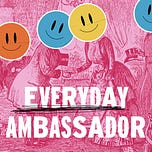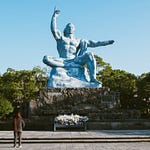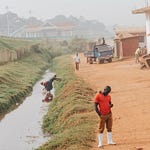The Spark of Resistance: Zsofia Banuta's Story
How can ordinary citizens fight authoritarianism and corruption, when democratic institutions begin to crumble?
Zsofia Banuta has done just that. After the 2018 Hungarian elections, manipulated through extreme gerrymandering and organized voter fraud, 100,000 people marched to demand a recount. Zsofia watched in dismay as nothing happened. "I was sitting in my living room, and I was thinking, what on earth?"
And that's when she decided to do something. "It's a very simple question. Who else if not me? Who else if not us? I think things can get so dark that something, some energy just comes out, and forces you to do something and believe in yourself."
From Investigation to Movement
Zsofia and friends started by crunching the election numbers. Something was fishy. So they conducted interviews with polling station workers and documented irregularities. Eventually, they were able to describe the full toolbox of dirty tricks Orbān used to rig the election. Their work was featured by press venues like the BBC and led to EU interventions.
What started as a simple investigation eventually became a multi-year effort to:
Mobilize artists and film-makers to explain what was happening
Train poll workers
Secure international election observation missions
Szofia and her colleagues have now expanded their work beyond Hungary—supporting student-led protests in Serbia, monitoring elections in Poland, and building connections across Europe's activist community.
Beyond the Inspiring Headlines
Zsofia is now co-founder of Unhack Democracy, a group that uses tactics ranging from research and journalism to theater and architecture. I discovered Unhack Democracy's newsletter on Substack and was immediately inspired by the positivity and out-of-the-box approach. Many of the group's methods, like the focus on play and hope, dovetail with the Everyday Ambassador project.
So I was surprised when I had the honor of speaking with Szofia in person to hear a very different story—a brutally honest and authentic account of the darkness and pain of countering authoritarianism. We discussed the psychological toll of sustained advocacy work. Her sincerity caught me off guard: "Had I known how hard the road was going to be, I'm not sure I would have done it!"
The Reality of Democratic Decline
Zsofia described:
The sense of shock people experience when they discover their democracy has been stolen, and how this quickly turns into fatalism and complacency
How she and her team even fell into "depression" when, despite all their efforts, Orban won yet another election: "We had to recalibrate"
How the loss of intellectual support and implicit protection from the US embassy in Hungary after the change of US administrations has demoralized and discouraged activists
I had turned to Zsofia for tips and tricks for how to unhack our democracy. What I got was an empathetic mirror into the sense of disorientation and disbelief that has paralyzed many of us in the United States over the last months.
The Hope-Based Solution
In response, Zsofia and her team have launched a "hope-based mindset incubator" to support civil society leaders and cultivate culture change. This is where the arts, from architecture to homemade zines, come in. As she explained,
the first thing we need to change is not society and governments, but ourselves.
Lessons for Fighting Authoritarianism
There were so many takeaways from Zsofia's experience countering authoritarianism. As you listen to the conversation, Zsofia's frank and down-to-earth wisdom will surely resonate. Here are just a few points I am pondering for myself:
Be Brave
Zsofia knows that intimidation and fear are real. But she says it's critical to dare to stand up, even in small ways, to say what you want to say. It's important not just for the cause but for your own wellbeing.
Cultivate Hope
Authoritarianism and corruption kill hope. And hope is the only counter to fear. I have learned a great deal about hope from Hiro Miyazaki's writings (e.g., The Method of Hope, 2004, The Economy of Hope, 2017). As Miyazaki argues, hope is not optimism.1 It's not a belief that everything will work out the way you want. But it's the most powerful political force there is. And you can't create hope for yourself—you can only create it for others. Hope needs human relationality to thrive.
Stick to Your Message
Zsofia has plenty of experience with misinformation. She has been called all kinds of names—"Soros agent, foreign agent...It works, unfortunately." She says it can be tempting to respond, to counter the misinformation and disprove it. But don't, she says. Stick to what you want to say.
Make Space for New Thinkers
A key theme of our conversation was how young people are reclaiming civic space, not through traditional political channels but through collaborative cultural projects that redefine what democracy means to them. Zsofia has come to appreciate how the traditional apparatus of civil society, from donor organizations to international institutions, creates unintentional barriers to entry. Younger generations have different issues, different ways of doing things, and different ways of expressing themselves. We need to open up the channels to make room for their creativity.
Collaborate
And most importantly, coordinate your message with others to break through the information blockades. Fighting authoritarianism without a coalition is dangerous and ineffective.
Join Us for a Live Conversation!
For more on Unhack Democracy, check out their Substack Newsletter, Rewire Democracy.
Next week on the podcast we're trying something new—we’ll be recording before a live virtual audience!
On May 8th on Substack (11 AM East Coast Time, 5 PM Brussels Time), I'll be talking with Zsofia and her co-founder Elliot Goat about strategies civil society can use to counter rising authoritarianism. They'll answer your questions about how they did it—and what the lessons may be for the United States.
So please join us live and bring your questions! Just follow this link:
Hiro Miyazaki 2018 “Hope versus Optimism.” Peppermint 39 (Spring 2018): 59.














Share this post